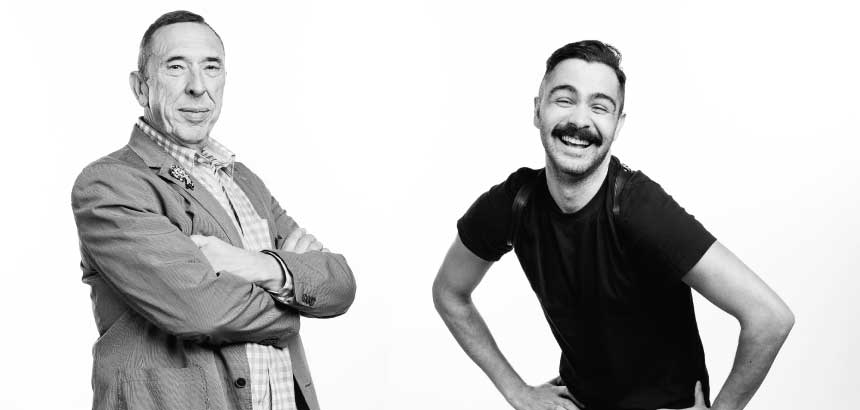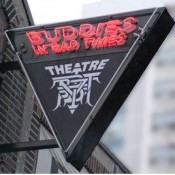or: Why you should risk everything and sign up for Meisner classes
Since September, we have been working with an incredible intergenerational group to create The Youth/Elders Project – a space where identities, personal histories and queer perspectives get turned into performance. As we get closer to our Mainstage performance later this month, some of the participants will be taking over our blog to talk about the journey to here. Daniel Carter and Brian Cope took our challenge to share their process on the blog and ran with it…
Theatre is theatre. But it is not at all what it appears.
Any performer or creator who has respected and embraced the theatre process knows this. Any viewer who has been moved knows this implicitly. Alas, some newbies, like us, get a life lesson, which, if they are willing – and they may not have a choice – is transformative.
Daniel is a rather green playwright and actor, and Brian is a semi-retired corporate business type – now an aspiring actor. We are fortunate to be a part of the ensemble for The Youth/Elders Project.
We had a conversation recently about our experience in the project, which quickly focused on the ways the creative process impacted or did not impact us. We decided to independently reflect and write narratives based on this conversation.
To our amusement, and in credit to the process, our perspectives were quite similar—just styled differently. What follows is a mash-up of our narratives, which in itself is evidence of the unifying impact of the theatre process…
Let’s paint the scene:
Two people. They stand face-to-face. Completely neutral. And they Repeat:
You have black hair.
I have a black hair.
You have black hair.
I have black hair.
You have black hair.
I have black hair. A smile.
You’re smiling.
I’m smiling.
You’re smiling.
I’m smiling.
I love that you’re smiling.
You love that I’m smiling.
I love that you’re smiling.
You care about me.
I care about you.
Isn’t it funny how uncomfortable we are with being seen—like truly seen—like here-I-am-I’m-not-doing-anything-just-sitting-here-and-you-are-seeing-me seen? To be fair it’s a vulnerable experience. We are rid of our typical tactics—words, gestures, headphones, cell phones—and we are completely unvarnished for all to see. It’s kind of like getting naked in front of a stranger for the first time. It’s as though you’re saying “Here I am, you can take it or leave it;” it’s a risk.
Theatre is all about risk. At their best, a performer brings presence to the stage. We don’t pretend we are whatever we are. And that takes risk—and a respect for the process.
During the process of devising The Youth/Elders Project, the cast had a chance to learn and practice Stanford Meisner’s exercise of Repetition (aka the Meisner Technique). Essentially, the technique focuses on an actor’s ability to be present, honest, and authentic. To see, and to be seen.
The technique encourages one to deal with each other’s humanity; we were pushed to connect to ourselves and to each other; to risk having our hearts ripped out, trampled on, and given back to us, just to have it happen again, and again, and again. It’s a revelatory experience because it makes you feel real…it makes you feel.
We aim to bring it all and dump our guts in front of everyone to digest it as they will. It may be a delicious looking repast, or some unsightly mess generating revulsion. But if we do our jobs well, it will be real. And the audience will have a visceral experience.
Building up. Stripping away. Angles. Lights. More and less words. Subtlety and grand gesture. Awareness or oblivion. To connect we must give into the process, and to do that requires vulnerability and presence. Isn’t that what it’s all about: connection? Otherwise, why bother?
Western culture is disconnecting. Feelings are typically seen as weakness, and we learn, over time, that the less connected we are the less likely we are to be hurt. But when you stand in front of someone, just about to begin an exercise in Repetition, you are seen and you see that person; and they make you smile, they make you laugh, they make you cry, they make you explode. And it’s honest, it’s real—it’s overwhelming because you are standing there allowing someone to see your authentic self.
When the Meisner Technique was reintroduced in the process for the Youth Elders Project, I began to think about the parallels between the technique and the ways in which we live our lives as LGBTQ peoples.
The risk that we take to be seen, to stand there as our authentic selves, and to live truthfully. It’s truly impactful, both on stage and in real life. When we come out, we are taking a risk—just like in the rehearsal room, but with greater consequence. To be ostracised, to be disowned, to be rejected. But the payoff is worth it. We are real; we are honest; we allow ourselves to be seen as who we are.
And really, how often do we get to be our true selves? And more to the point, how often are we seen as our true selves? We think this is where the process has had an immense impact on our lives. We don’t often get the space to allow ourselves to be seen, to be truthful, and to be authentic. We are too often concerned with the judgments that will be cast upon us, with being hurt, with being misunderstood. And this allowance is the dual gift given to us from the theatre, from coming out.
In our Rhubarb showcase, we entered the stage, and we stood in front of the audience. Neutral. Here we are. This is enough. We are here. We are present. We are enough. It was an authentic moment, a quiet self-proclamation that took no effort at all other than follow Meisner’s rules of Repetition: be present, be truthful, and be honest.
And now knowing, having had a consciousness-raising we are not allowed to forget. We can’t pretend we are present any longer when we know we are not. We must strip away artifice in every aspect of our being, and, in doing so, light shines in brighter and brighter. Authenticity becomes less of a mantra and more of a principle.
Damn the theatre process! It changed us without our permission.
The Youth/Elders Project closes our 2016/17 Season with a limited run of performances May 31-June 4, 2017 – click here for more information.
photo by Tanja-Tiziana


